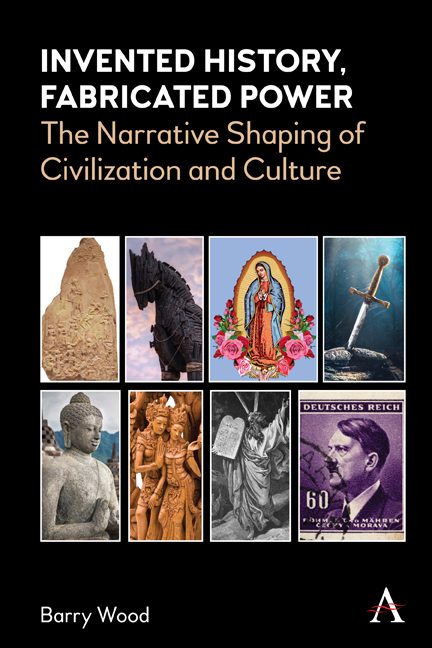Book contents
- Frontmatter
- Dedication
- Contents
- Acknowledgments
- About the Cover
- List of Abbreviations
- Introduction
- Prologue: The Prehistory of Power: Souls Spirits, Deities
- Part One Kings and Emperors
- 1 Divine Kingship in Mesopotamia
- 2 Pharaohs among the Indestructibles
- 3 Kingship among the Hebrews
- 4 The Deification of Roman Emperors
- 5 The Deva-Rajas in India and Southeast Asia
- 6 The Chinese Mandate from Heaven
- 7 The Japanese Imperial Cult
- Part Two Empires before the Common Era
- 8 The Legendary Empire of the Sumerians
- 9 Legendary Empires of Preclassical Greece
- 10 Patriarchs, Exodus, and the Epic of Israel
- 11 Legendary Empires of Ancient India
- 12 The Legendary Founding of Rome
- Part Three Founders
- 13 Moses: The Israelite Lawgiver
- 14 Buddha and Legends of Previous Buddhas
- 15 The Savior Narratives
- 16 Muhammad, the Qur’an, and Islam
- 17 The Virgin Mary through the Centuries
- 18 Tonantzin and Our Lady of Guadalupe
- Part Four Empires of the Common Era
- 19 Narrative Inventions of the Holy Roman Empire
- 20 The Epic of Kings, Alexander the Great, and the Malacca Sultinate
- 21 The Franks, Charlemagne, and the Chansons de Geste
- 22 The Legendary Kingdom of King Arthur
- 23 Ethiopian Kings and the Ark of the Covenant
- 24 Narratives of the Virgin Queen
- Part Five Ideologies
- 25 Discovery: The European Narrative of Power
- 26 Epics of the Portuguese Seaborne Empire
- 27 Dekanawida and the Iroquois League
- 28 The New England Canaan of the Puritans
- 29 The Marxist Classless Society
- 30 Adolph Hitler: Narratives of Aryans and Jews
- Epilogue: A Clash of Narratives
- Bibliography
- Index
- About the Author
29 - The Marxist Classless Society
Published online by Cambridge University Press: 15 December 2020
- Frontmatter
- Dedication
- Contents
- Acknowledgments
- About the Cover
- List of Abbreviations
- Introduction
- Prologue: The Prehistory of Power: Souls Spirits, Deities
- Part One Kings and Emperors
- 1 Divine Kingship in Mesopotamia
- 2 Pharaohs among the Indestructibles
- 3 Kingship among the Hebrews
- 4 The Deification of Roman Emperors
- 5 The Deva-Rajas in India and Southeast Asia
- 6 The Chinese Mandate from Heaven
- 7 The Japanese Imperial Cult
- Part Two Empires before the Common Era
- 8 The Legendary Empire of the Sumerians
- 9 Legendary Empires of Preclassical Greece
- 10 Patriarchs, Exodus, and the Epic of Israel
- 11 Legendary Empires of Ancient India
- 12 The Legendary Founding of Rome
- Part Three Founders
- 13 Moses: The Israelite Lawgiver
- 14 Buddha and Legends of Previous Buddhas
- 15 The Savior Narratives
- 16 Muhammad, the Qur’an, and Islam
- 17 The Virgin Mary through the Centuries
- 18 Tonantzin and Our Lady of Guadalupe
- Part Four Empires of the Common Era
- 19 Narrative Inventions of the Holy Roman Empire
- 20 The Epic of Kings, Alexander the Great, and the Malacca Sultinate
- 21 The Franks, Charlemagne, and the Chansons de Geste
- 22 The Legendary Kingdom of King Arthur
- 23 Ethiopian Kings and the Ark of the Covenant
- 24 Narratives of the Virgin Queen
- Part Five Ideologies
- 25 Discovery: The European Narrative of Power
- 26 Epics of the Portuguese Seaborne Empire
- 27 Dekanawida and the Iroquois League
- 28 The New England Canaan of the Puritans
- 29 The Marxist Classless Society
- 30 Adolph Hitler: Narratives of Aryans and Jews
- Epilogue: A Clash of Narratives
- Bibliography
- Index
- About the Author
Summary
Following philosophical breaks with the past during the eighteenth century, various innovative ideologies emerged: democracy, utilitarianism, transcendentalism, naturalism, pragmatism, and the like. Alongside these philosophical ideas, the Industrial Revolution was born. This moved manufacturing from cottage businesses to a new setting: the factory that employed members of the community, including workers who had migrated from rural to urban areas for employment in industry. Of various attempts to make sense of the resulting economy, none had as great an influence as that of the German Karl Marx (1818–1883), his intellectual partner, Friedrich Engels (1820–1895), and the Russian political revolutionary Vladimir Lenin (1870–1924).
The most visible works by Marx and Engels remain The Communist Manifesto (1848) and the massive three-volume Das Kapital (1867, 1885, 1894), the second and third of which were prepared by Engels from unfinished manuscripts and notes left by Marx at his death. During the post-World War II Cold War, the Soviet Union was considered the inheritor of Marxist principles though no real-world political system has matched the ideal Marx espoused, nor did any society in his time embody the moral sense that motivated his analysis. Nevertheless, the collapse of the Union of Soviet Socialist Republics (USSR) in 1989 discounted the importance of the Marxist analysis. But while history has shown how difficult if not impossible it was to construct a new society on Marxist principles, the analysis of capitalist economy by Marx and Lenin remains one of the most formidable in Western thought.
Marx and Engels brought into common usage the terms bourgeoisie and proletariat, which are a fossilized simplification of a complex societal structure. In their usage, the bourgeoisie were the owners of private property who controlled the means of production while the proletariat were the workers who carried out production. These make up the two great classes of society (another simplification), with the smaller class of bourgeoisie exploiting the much larger proletariat. Conflict between these makes up the fundamental “class struggle” of the system of capitalism. The proletariat does intensive labor to produce “commodities” (the topic of Kapital, Part I).
- Type
- Chapter
- Information
- Invented History, Fabricated PowerThe Narratives Shaping Civilization and Culture, pp. 327 - 336Publisher: Anthem PressPrint publication year: 2020



